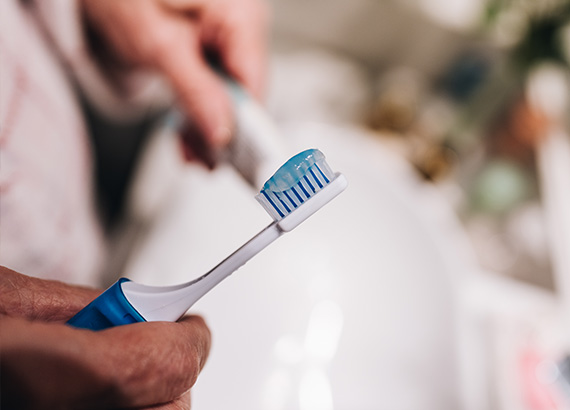Elderly Oral Health and Hygiene: Part One

If you’re caring for an elderly loved one, their oral health and hygiene should be a priority. Good oral care is essential not only for their health but also for maintaining proper nutrition.
Today, we begin a three-part blog series on this topic. In this first part, we’ll cover the basics of oral health and hygiene. The second will explore the connection between poor oral health and malnutrition, and the third will discuss the role of programs like Meals on Wheels.
At Vermont Aged Care, we understand the importance of good oral hygiene for the elderly. Our trained staff ensures vigilant attention to oral care, as poor dental hygiene can lead to nutritional issues. Following are some helpful tips to assist you in caring for your elderly loved ones.
Signs to Look Out For
Preventative care is key. If you notice signs of discomfort or difficulty in chewing or swallowing, it may be time for a dental checkup. Also, pay attention to any signs of bad breath, which could indicate underlying issues.
The Daily Routine
A daily oral care routine is crucial. Elderly individuals should brush their teeth twice a day using a soft toothbrush, followed by mouthwash and flossing if possible. For those with dentures, soaking in a solution and gentle brushing is necessary. As a caregiver, assist where needed and check for any visible issues like cavities or gum abnormalities.
Scheduling Regular Checkups
Regular dental checkups are essential—aim for at least twice a year. If you notice any signs of discomfort or potential issues, schedule an appointment right away. Many elderly individuals feel anxious about dental visits, so reassuring them and providing support can make a difference.
Encouraging Open Communication
Make sure your loved one feels comfortable discussing any oral health concerns with you. Many elderly people may hesitate to mention issues to avoid being a burden. Taking the lead in communication and asking the right questions can help prevent problems from escalating.
In Conclusion
To prevent conditions such as periodontal disease, dry mouth, thrush, or dental abscesses, a proactive approach to oral care is essential. This will support their overall health and quality of life.
Look out for our next blog in this series, where we’ll discuss the link between poor dental hygiene and malnutrition. Until then, we wish you and your elderly loved ones continued good health.
Recommended Reading:
- Care of Older People Toolkit – Oral Health
- Senior Smiles Initiative – University of Newcastle
- Oral Health and Hygiene Standards in Aged Care
This blog provides general advice. Please consult your GP for personalised information, or contact Vermont Aged Care for specialised support.

